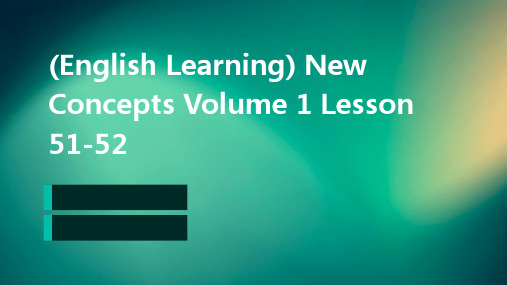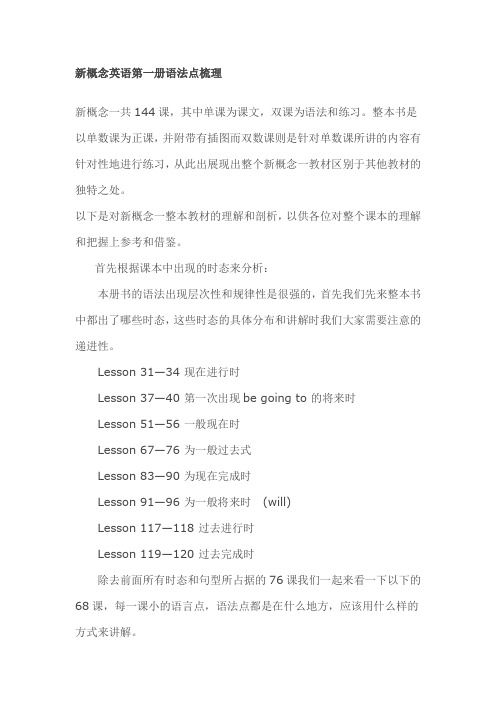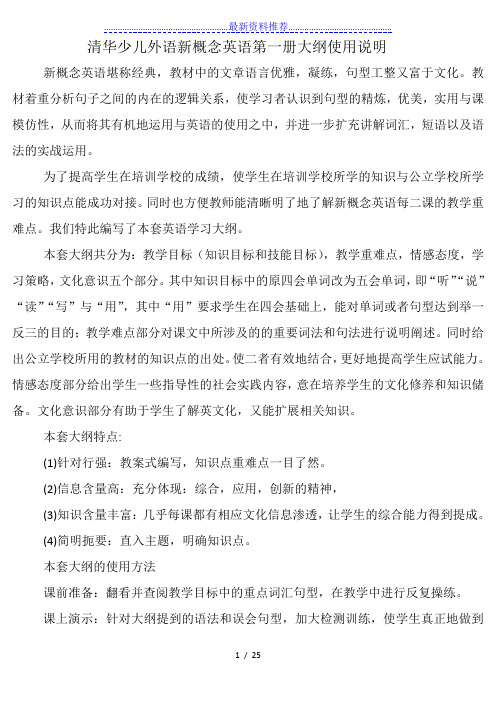新概念一同步语法强化51-55教学提纲
(英语学习)新概念第一册lesson51-52

Expression
In addition to the vocabulary, students also need to learn a set of common expressions used in the context of sports and fitness, such as "I'm feeling a bit out of breath" or "I need to do some strength training". These expressions will
Adverbial clauses
Another focus of this lesson is on adverbial clauses, which are used to provide additional information about a situation or event. Students learn how to identify and use different types of adverbial clauses, such as time clauses ("When I finish my workout") or condition clauses ("If I don't exercise regularly").
强烈推荐—新概念英语第一册语法点完全梳理(最完全版)

新概念英语第一册语法点梳理新概念一共144课,其中单课为课文,双课为语法和练习。
整本书是以单数课为正课,并附带有插图而双数课则是针对单数课所讲的内容有针对性地进行练习,从此出展现出整个新概念一教材区别于其他教材的独特之处。
以下是对新概念一整本教材的理解和剖析,以供各位对整个课本的理解和把握上参考和借鉴。
首先根据课本中出现的时态来分析:本册书的语法出现层次性和规律性是很强的,首先我们先来整本书中都出了哪些时态,这些时态的具体分布和讲解时我们大家需要注意的递进性。
Lesson 31—34 现在进行时Lesson 37—40 第一次出现be going to 的将来时Lesson 51—56 一般现在时Lesson 67—76 为一般过去式Lesson 83—90 为现在完成时Lesson 91—96 为一般将来时(will)Lesson 117—118 过去进行时Lesson 119—120 过去完成时除去前面所有时态和句型所占据的76课我们一起来看一下以下的68课,每一课小的语言点,语法点都是在什么地方,应该用什么样的方式来讲解。
在这里告诉学员新概念一的每一个单课的重点都是出现双课的标题和课后的练习题里面。
Lesson1—2语言点:与陌生人说话或引起别人的注意。
Excuse me. Yes? Pardon? Thank you very much.语法点:主系表结构this为主语,名词做表语1的一般疑问句以及它的肯定回答。
Is this your handbag? Yes, it is.Lesson 5—6语言点:如何介绍别人。
This is Miss Sophie Dupont. Nice to meet you.语法点:主语为第三人称单数的主系表结构。
She is French. He is German. It’s a Volvo.(L6)a/an 的使用。
Lesson 7—8语言点:如何自我介绍和相互认识。
Lesson51-52(教学设计)-2023-2024学年新概念英语第一册

5. 创新拓展(5分钟)
任务挑战:教师提出一个任务,如:“Write a short story about what you did yesterday.”,要求学生完成。
九.重点题型整理
1. 填空题型
题型描述:填空题要求学生根据语境,选择合适的一般过去时态动词形式填入空格中。
举例:I (1) my homework yesterday. (2) a movie with my friends.
答案:1. finished 2. watched
2. 选择题型
题型描述:选择题要求学生从给出的选项中选择正确的一般过去时态动词形式。
6. 过去进行时:过去进行时用于描述过去某个时刻正在进行的动作。构成是was/were + 动词的ing形式。例如:They were watching a movie last night.(他们昨晚在看电影。)
7. 过去完成时:过去完成时用于描述在过去某个时刻之前已经完成的动作。构成是had + 过去分词。例如:I had finished my homework before dinner.(我在吃晚餐之前已经完成了我的家庭作业。)
9. 过去完成时的运用:过去完成时用于描述在过去某个时刻之前已经完成的动作,可以用时间状语如before, after等来修饰。例如:I had finished my homework before my mother came back.(在我母亲回来之前,我已经完成了我的家庭作业。)
1新概念教学大纲

《新概念英语第一册教学大纲》
一、本门课程介绍
新概念英语第一册是英语学习者的入门课程,是练好英语基本功最好的学习书籍。
从基本的发音、重音和语调开始,逐步学会使用英语中的基本词汇、语法及句型结构,为学生进一步学习打下牢固的基础。
学好第一册,是练好英语基本功的关键,掌握了第一册,才真正踏进了英语之门。
适合于零起点或英语基础差,欲在短期内掌握英语基础的学习者,如中学生或及成年初学者,同时也可以帮助学生进一步巩固所学的知识。
第一册大部分的场景对话和口语基本句型都包括其中,同时,当中的800个词汇全部是英语日常用语中出现频率最高的词汇。
二、课程目标
1、掌握教材所涉及的英语语音、语调、基础语法、词法和句法达到初中一年级的英语水
平
2、对英语形成基本的语感,熟悉标准的英语发音系统,拥有简单的英语听力能力
3、能进行简单的日常对话,掌握近两百个口语常用句型,掌握近千个日常会话所需单词
4、掌握包括现在进行时等在内的所有英语基本时态,能进行简单阅读和写作
5、掌握高频词汇800〜1500
三、教学重点
帮助学生建立学习英语的自信,找到正确的、适合自己的学习方法。
在学习的过程中掌握课程中出现的常用短语,日常会话,一般习惯用法等。
并养成多听多说的学习习惯,培养英语思维。
四、教学规划。
新概念英语一册教学大纲

新概念英语第一册教学大纲一、知识要点上半部分(第1~72课)1.音标:2.字母:3.词汇:掌握550个基本词汇(包括称谓、日常用品、食物、颜色、疾病、国家、国籍、天气、季节、月份、星期等)。
4.简单句的六种基本句型:①主语(Subject)+谓语(vi)如:Peterworksveryhard.②主语(Subject)+系动词(Link.V)+表语(Predicate)如:Thequestionsaretoodifficult.③主语(Subject)+谓语(vt)+宾语(Object)如:Weusuallyreadnewspaperinthelivingroom.④主语(Subject)+谓语(vt)+间接宾语(OI)+直接宾语(OD)或:主语(Subject)+谓语(vt)+直接宾语(OD)+to/for+间接宾语(OI)如:Isenthimapresent.Isentapresenttohim.⑤主语(Subject)+谓语(vt)+宾语(Object)+补语(Complement)如:Youshouldkeeptheroomcleanandtidy.⑥T herebe+主语(Subject)+其它如:Thereisavaseonthetablenearthewindow.5.时态:①一般现在时:⑴概念:表示经常、反复发生的动作或行为及现在的某种状况。
⑵常与often,sometimes,always,usually等频率副词连用,还与everymorning/day/week,onWednesday,inthemorning/afternoon/evening等时间状语连用。
⑶基本结构:动词原形(如主语为第三人称单数,动词要加s或es)⑷否定形式:am/is/are+not;若谓语动词为行为动词,则在其前加don't,如主语为第三人称单数,则用doesn't,同时还原行为动词。
新概念一教学大纲

课程课次课程模块及内容L1-61. 语法:①一般疑问句②形容词性物主代词2. Simple Dialogues.L7-121. 课前测试2. 语法:①特殊疑问句:对国籍,工作进行提问②名词所有格3. Simple Dialogues.L13-181. 课前测试2. 语法:①特殊疑问句:对颜色提问②名词复数的变化3. Simple Dialogues.L19-241. 语法:①特殊疑问句: which ②there be句型③人称代词: 宾格2. Simple DialoguesL25-301. 课前测试2. 语法:①冠词②情态动词must③where引导的特殊疑问句3. Simple Dialogues.L31-361. 课前测试2. 语法:①现在进行时be + doing②What is he doing?③动词+ ing3. Simple Dialogues.L37-421. 课前测试2. 语法:①be going to 表示将来的用法②不定代词any 和some ③双宾语3. Simple Dialogues.L43-481. 语法:①Are/ Is there any…? (复习) ②情态动词can③Do you like…? Do you want …?2. Simple Dialogues.L49-501. 语法:①选择疑问句②一般现在时的单数第三人称2. Simple Dialogues.L51-541. 课前测试2. 语法:①句型what…like?②国籍词3.Simple Dialogues.L55-561. 课前测试2. 语法:①时间副词②复习一般现在时态3.Simple Dialogues.L57-601. 课前测试2. 语法:①可数名词与不可数名词②一般现在时和现在进行时的复习,区别L61-641. 语法:①情态动词must②并列连词so③形容词的比较级2. Simple Dialogues.L65-681. 语法:①反身代词②时间表达法③一般过去时:系动词be2. Simple Dialogues.L69-721. 课前测试2. 语法:①时间介词②复习there be 句型③一般过去时(动词过去式的构成)3.Simple Dialogues.4.期中考试L73-74 1. 课前测试2. 语法:①副词的用法②复习一般过去时(动词过去式)3. Simple Dialogues.L75-781. 课前测试2. 语法:①一般过去时(时间状语)②情态动词的否定疑问句③复习时间介词3. Simple Dialogues.L79-801. 课前测试2. 语法:① haven’t got 的用法②情态动词must 和need3. Simple Dialogues.L81-841. 课前测试2. 语法:①动词have 表达行为②现在完成时(1)3. Simple Dialogues.L85-881. 课前测试2. 语法:现在完成时(2)(时间状语,疑问句,否定句)3. Simple Dialogues.L89-921. 语法:①情态动词may ②现在完成时(3)③一般将来时2. Simple Dialogues.L93-961. 课前测试2. 语法:①一般将来时(时间状语,疑问句)②对时间提问③had better 的用法3. Simple Dialogues.L97-981. 语法:名词性物主代词2.Simple Dialogues.L99-1001. 课前测试2. 语法:宾语从句(一)3. Simple Dialogues.L101-1021. 课前测试2. 语法:①宾语从句(二)②反义疑问句3. Simple Dialogues.L103-1041. 课前测试2. 语法:①宾语从句(三)② too, very, enough3.Simple Dialogues.L105-1061. 课前测试2. 语法:①动词不定式②祈使句3.Simple Dialogues.L107-1101. 课前测试2. 语法:形容词的比较级,最高级(一)形容词的比较级,最高级(二)3.Simple Dialogues.L111-1121. 课前测试2. 语法:形容词的比较级,最高级(三)3. Simple Dialogues.L113-1141. 语法:①no & none ② so与neither 引导的简短回答2. Simple Dialogues.L115-1161. 课前测试2. 语法:①复合不定代词②动词→形容词3.Simple Dialogues.L117-1181. 课前测试2. 语法:①复习现在进行时②过去进行时3. Simple Dialogues.L119-1201. 课前测试2. 语法:①复习现在完成时②过去完成时3. Simple Dialogues.L121-1221. 课前测试2. 语法:定语从句(一)(关系代词)3. Simple Dialogues.L123-1241. 课前测试2. 语法:定语从句(二)(关系代词可省略)3. Simple Dialogues.L125-1261. 语法:情态动词(一)(canmustneedhave to)2.Simple Dialogues.L127-1281. 课前测试2. 语法:情态动词(二)(情态动词+be 表示推测)3. Simple Dialogues.L129-1301. 课前测试2. 语法:情态动词(三)must have been…can’t have been…3. Simple Dialogues.L131-1321. 课前测试2. 语法:情态动词(四)may,may be,may have been3. Simple Dialogues.L133-1361. 课前测试2. 语法:①宾语从句(四)时态与语序②宾语从句(五)与情态动词连用: might, could, would3. Simple Dialogues.L137-1381. 课前测试2. 语法:if 引导的条件状语从句主将从现3. Simple Dialogues.L139-1401. 课前测试2. 语法:宾语从句(六)that(可省略), if, why, what, when3. Simple Dialogues.L141-142语11.语法:①复习一般过去时,过去完成时②被动语态(一)(一般现在时,一般过去时)2. Simple Dialogues.3. 期末考试L143-1441. 课前测试2. 语法:被动语态(二)一般将来时,现在完成时3. Simple Dialogues.。
新概念英语第一册Lesson51~56重点语法

【导语】新概念英语⽂章短⼩精悍,语句幽默诙谐,语法全⾯系统。
适合各个阶层的⼈群学习参考。
相信有了新概念英语,你也可以成为“⼤神”级别的⼈物!还在等什么?快来加⼊学习吧!⽆忧考⼩编与您⼀起学习进步!新概念英语第⼀册Lesson51~52重点语法 ⼀、重要句型或语法 1、⼀般现在时 1)表⽰天⽓,如:What's the weather like in spring? It's often windy in March. 2)表⽰⽓候,如:What's the climate like in your country? It's very pleasant. 3)it作主语,表天⽓或⽓候。
2、国籍的问答 Where do you come from? I come from Greece. ⼆、课⽂主要语⾔点 Where do you come from? I come from Greece. 也可以⽤:Where are you from? I am from Greece. What's the climate like in your country? / What's the weather like in spring? 注意区分climate与weather:指某⼀地区总的⽓候情况,如⼲旱、湿润、温度、凉爽等;weather指某地某天的具体天⽓情况,如阴晴、降⽔、⽓温、风⼒、风向等。
It's very pleasant. pleasant来源于please,表⽰“令⼈愉快的”。
在课⽂⾥⽤来修饰天⽓,表⽰“宜⼈的,舒适的”。
It's often windy in March. 此处可介绍表天⽓的名词及其形容词的变化,即在名词后加后缀-y。
此外,也可以介绍⼀年中12个⽉份的表达,可顺便介绍12个⽉的历史故事。
Its' always warm in April and May, but it rains sometimes. 句中的sometimes⼀般位于助动词后⾯和实意动词前⾯,此处放在句末,主要是其强调作⽤。
新概念一册教学大纲

清华少儿外语新概念英语第一册大纲使用说明新概念英语堪称经典,教材中的文章语言优雅,凝练,句型工整又富于文化。
教材着重分析句子之间的内在的逻辑关系,使学习者认识到句型的精炼,优美,实用与课模仿性,从而将其有机地运用与英语的使用之中,并进一步扩充讲解词汇,短语以及语法的实战运用。
为了提高学生在培训学校的成绩,使学生在培训学校所学的知识与公立学校所学习的知识点能成功对接。
同时也方便教师能清晰明了地了解新概念英语每二课的教学重难点。
我们特此编写了本套英语学习大纲。
本套大纲共分为:教学目标(知识目标和技能目标),教学重难点,情感态度,学习策略,文化意识五个部分。
其中知识目标中的原四会单词改为五会单词,即“听”“说”“读”“写”与“用”,其中“用”要求学生在四会基础上,能对单词或者句型达到举一反三的目的;教学难点部分对课文中所涉及的的重要词法和句法进行说明阐述。
同时给出公立学校所用的教材的知识点的出处。
使二者有效地结合,更好地提高学生应试能力。
情感态度部分给出学生一些指导性的社会实践内容,意在培养学生的文化修养和知识储备。
文化意识部分有助于学生了解英文化,又能扩展相关知识。
本套大纲特点:(1)针对行强:教案式编写,知识点重难点一目了然。
(2)信息含量高:充分体现:综合,应用,创新的精神,(3)知识含量丰富:几乎每课都有相应文化信息渗透,让学生的综合能力得到提成。
(4)简明扼要:直入主题,明确知识点。
本套大纲的使用方法课前准备:翻看并查阅教学目标中的重点词汇句型,在教学中进行反复操练。
课上演示:针对大纲提到的语法和误会句型,加大检测训练,使学生真正地做到学以致用。
课中教授:在传授支持的同时,讲一些文化知识和人生哲理。
寓教于乐。
课后回顾:针对大纲的知识点,教授出一些相关练习题,达到巩固的目的。
二、教学大纲。
- 1、下载文档前请自行甄别文档内容的完整性,平台不提供额外的编辑、内容补充、找答案等附加服务。
- 2、"仅部分预览"的文档,不可在线预览部分如存在完整性等问题,可反馈申请退款(可完整预览的文档不适用该条件!)。
- 3、如文档侵犯您的权益,请联系客服反馈,我们会尽快为您处理(人工客服工作时间:9:00-18:30)。
同步语法强化Lesson 51-55
1.特殊疑问句型:What...like?
2.表示国籍(或所属地区)的形容词和表示国家(或地区)的名词
3.定冠词+ 姓氏名词复数表示一家人
4.介词at
一.写出下列国家(或地区)名称的形容词形式。
1. Austrila
2. Africa
3. Britain
4. England
5. China
6. America
7. Asia 8. Nigeria
9. Portugal 10. India
11. Spain 12. Korea
13. Japan 14. France
二.选择填空。
1. What the climate in winter here?
A. does;like
B. is;likes
C. is;like
D. do;likes
2. This is Ben. He's . He speaks ?
A.England;English
B. English;England
C. England; England
D.English;English
3. It is often wet in the west and warm in the South.
A.sometimes
B. some time
C.some times
D.sometime
4. David comes from Australia.He is .
A. an Englishman
B. a Chinese
C.an America
D.an Australian
5. I can a lot from the Internet.
A.learn
B. learns
C.learning
D.learned
6. What are they?
A.nation
B.national
C.nationality
D.international
7. Lily has four lessons the morning and three the afternoon.
A. in;on
B. in;at
C. in;in
D. on;on
8. Nancy and Jack have any hobbies?
A. Do
B.Does
C.Has
D. Have
9.- How does your sister spend the weekend?
- Oh,she usually TV,and she is TV now.
A. watch;watch
B. watching;watches
C. watches;watching
D.watches;watches
10.David any classes on Sundays.
A. don't have
B. hasn't
C.doesn't has
D.haven't
三.改错题。
1.It's often rain in Summer.
2.The Smiths lives at 65 King Street.
3.He goes to school everyday.
4.The children do his homework in the evening.
5.They always arrive at home six.
6.Tom usually goes to work lately.
7.She comes from Indian.
8.It's cold and warm in September.
9.I usually watch TV in night.
10.Where are you come from?
四.用所给动词的适当形式填空。
1.Don't Chinese in the English class. (speak)
2.It sometimes in Spring. (rain)
3.Mr. and Mrs. Smith usually at home on Sunday. (stay)
4.To you the truth,she doesn't like the house at all. (tell)
5.John drinking milk. (not like)
6.He the magazines in the living room now. (read)
7.Mrs. David wants to some fruit today. (buy)
8.He sometimes in the armchair and newspapers. (sit,read) 五.按要求转换句型。
1.It is hot in summer. (就划线部分提问)
2.The Andrews live in a small town. (就划线部分提问)
3.My sister often takes me to school in the morning. (改为一般疑问句)
4.The children usually go to bed early in the evening. (改为否定句)
5.She usually stays at home at night. (改为一般疑问句)
6.Mrs. Sawyer watches TV every evening. (改为现在进行时)
7.The Smiths are from Britain. (就划线部分提问)
8.The boys are doing their homework now. (就划线部分提问)
六.完形填空。
It's a fine Sunday morning.There are many people in the park.Many of 1 are young and 2 are old. Some Young Pioneers are playing games over there.Two boys are playing 3 their yo-yos.A girl is flying a kite.Two children are 4 a toy boat.There is a lake in the park.The water is clear.There are some
5 on the lake.Near the lake a young man is reading.There is a house near the lake.Beside
6 house two men are working.A woman is watering the flowers.Look at that big tree.There are some birds
7 it.Under it are some men.Four of them are playing cards.One of them is
8 two cats.The cats are running up the tree.What do they want to do?They want to
9 the birds.What 10 can you see in the park?
1.A they B them C their D theirs
2.A some B other C the other D much
3.A to B on C with D for
4.A doing B making C flying D reading
5.A birds B ships C buses D boats
6.A a B an C the D ∕
7.A in B on C under D at
8.A in B looking like C look at D looking at
9.A give B take C bring D catch
10. A about B else C other D the other
七.
八.汉译英
1.你喜欢夏天还是春天?
2.他打算把书架油漆成什么颜色?
3.张太太每天下午做家务。
4.你们国家气候怎么样?
5.夏季白天很长,夜晚很短。
6.他不喜欢冬天,他女儿也不喜欢。
7.我们打算今天晚上去看一场电影。
8.天气是英国人最喜欢讨论的话题。
